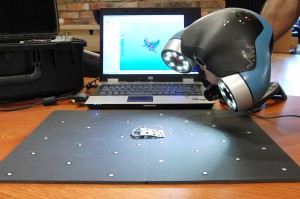The Virtual Curation Laboratory means that anybody can have access to the world’s greatest artifacts and we can all become archaeologists in our own home. That’s going to be incredible, but it still leaves us with a problem that we can overcome with a little lateral thought and scientific progress.
This project that started out as a Department of Defence-funded project to scan items at the Virginia Commonwealth University was always going to spread. It was always going to be just too big. Now we’re scanning items from historic sites. Engineering departments are getting involved at some universities. Elsewhere groups are focusing on the house George Washington grew up in.
This is the edge of something great, but it’s too disparate. It’s too random. But there’s nothing we can do about it right at this moment.
What is clear is that if a small group of archaeologists tries to service the whole world, if a select group is in charge of the input side, then we’re never going to get there. It’s always going to be the seed of a great idea, but it will die on the vine.
We could, theoretically, scan everything in the world. Every dinosaur bone, every caveman’s tool, every piece of jewelry from the Middle Ages that is locked away in museums, very painting in the world could become data.
In the end, it’s what we have to do.
Computer analysis could change our view of the world
With modern machine learning, we could set the computers to work and find patterns that we would never see. We could find similarities between the great works of art and maybe uncover some of the secrets of artistic, engineering and mathematical genius. There’s so much we can learn, but right now we are nibbling at the edges of greatness.
So what is the missing link here?
It’s simple: cheap scanners.
Scanning the horizon
The actual act of scanning a piece really isn’t that complex, but it is expensive. Even basic handheld scanners cost too much and the results might not be good enough for the computer analysis. We need something cheaper that produces commercial grade results.
It will come, the only question is when?
As scanners come down in price then schoolchildren could do this as part of their studies, retirees could do it for fun, even prisoners could do it to pass the time.
If this fed in to a master library, a Wikipedia-style fountain of historic knowledge with historians at the helm, then we would have the people power required for such a monumental task.
This will make the public an active participant in historical research, rather than a passive sponge that is expected to simply soak up the facts that are spoon-fed by the industry.
History comes alive
Children in particular stand to benefit from this step change. History is often seen as dry and dull, but if the children can take an active part in the process and actually make discoveries based on computer models, rather than learning dates and facts, then the subject instantly comes alive.
Schools could collaborate with each other, universities or the local museum through an outreach programme that will give each project a goal. Imagine a world where schools all around the world are actually feeding into a central library of artifacts, which are then sent to a vast number of enthusiasts around the world as digital models.
A global passion project
Suddenly history will evolve and literally anybody can study any period, geographical location or specialist subject that takes their fancy. It will be a global passion project with millions of people contributing to the cause. Our understanding of the world we once lived in will simply have to advance at a staggering rate.
We’ll find connections between civilisations from opposite sides of the world. We’ll find genetic links that will give us a new insight into the migration of the populations from around the world and foodies will provide insights into the diet of people through the ages. Priorities will go out the window, people will study what they want and the discoveries will come from random angles.
In the future the historian’s job will be more about aggregation and analysis, because there will be vast swathes of information that simply grows by the day.
It’s going to be immense. All we need now are the scanners.



